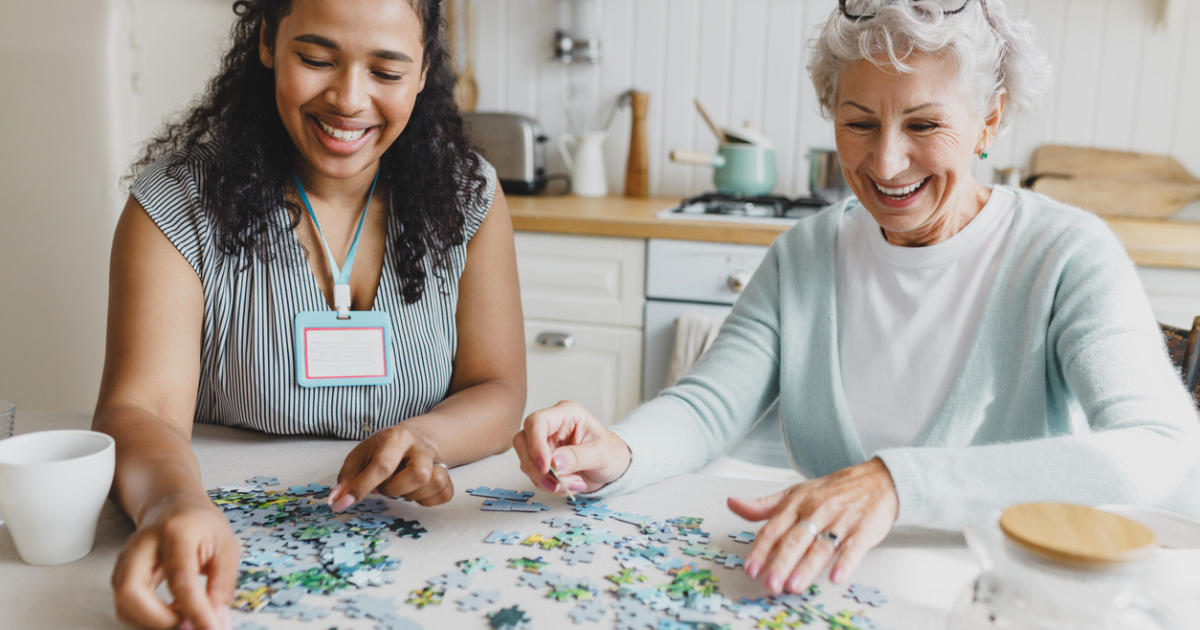
As we age, staying mentally sharp becomes more critical than ever. Just as we exercise to stay fit, our brains also benefit from mental workouts. For seniors, engaging in cognitive exercises offers far-reaching benefits: strengthening memory, improving focus, and fostering independence.
What Are Cognitive exercises?
Cognitive exercises are specific activities aimed at keeping the mind active and sharp.
Think of them as a workout for the brain. They are designed to challenge mental skills like memory, focus, and problem-solving. These exercises can be anything from memory games and puzzles to creative tasks that require quick thinking and strategy.
Certain cognitive functions tend to slow down as we age. However, research shows that engaging in cognitive exercises can slow this process and keep the mind more resilient.
These exercises act like "brain fuel" that stimulates neural pathways and helps preserve mental agility. This all helps boost everyday memory recall and increases focus.
Games like Sudoku, crosswords, or learning new hobbies are great for this purpose. More advanced activities (like learning a musical instrument or practicing meditation) can also be helpful.
Benefits of Cognitive Exercises for Seniors
These activities are not just brain boosters – they are powerful tools for increasing quality of life and independence.
1. Memory Retention
Regular cognitive exercises help improve and preserve memory.
Whether recalling names, remembering daily tasks, or holding onto memories, these activities strengthen neural connections to make storing and retrieving information easier.
Seniors who engage in memory-focused games often feel more confident in daily interactions, knowing they can count on their recall.
2. Better Focus
Distractions can become more challenging to manage with age, but cognitive exercises that help train focus can make a real difference.
Games that require attention to detail help improve concentration. By practicing focus, seniors can better enjoy everyday tasks like reading, cooking, or conversations without feeling mentally fatigued.
3. Delaying Cognitive Decline
Engaging the brain regularly can help delay age-related cognitive decline. Studies show that consistent mental activity can help slow the progression of dementia and other cognitive disorders.
For seniors, this means maintaining a stronger grasp on independence and avoiding the feeling of "losing touch" with one’s surroundings.
4. Boosting Mood and Reducing Stress
Beyond cognitive benefits, these exercises provide emotional perks, too. Seniors often experience feelings of accomplishment when mastering a new skill or finishing a challenging puzzle.
This sense of achievement can uplift their mood, reduce stress, and create positive associations with daily routines.

Top Cognitive Exercises to Improve Memory
Here are some of the best activities that help boost memory and add enjoyment to the day.
Memory Games
Memory games – like puzzles, Sudoku, and classic memory-matching games – are perfect for keeping the brain sharp. They encourage the brain to focus on recalling details, matching patterns, and solving problems while strengthening neural connections.
For example, a simple game of Sudoku trains the brain to recognize sequences and spot patterns. This helps with daily recall and problem-solving.
Similarly, memory-matching card games can increase visual recall and improve mental processing speed to help seniors stay alert and mentally flexible.
Learning New Skills
Picking up a new hobby is a fantastic way to keep the mind young. Activities like knitting, painting, or playing a musical instrument stimulate different parts of the brain to create new pathways and build resilience.
For example, knitting requires focus, hand-eye coordination, and pattern recognition. This all supports memory retention and brain health.
Playing an instrument uniquely engages memory and motor skills, offering a mental and physical workout.
Reading and Storytelling
Reading and storytelling are timeless ways to stimulate memory and increase communication. Reading a book encourages the brain to focus on details, remember storylines, and retain information.
For seniors, discussing and recalling stories also brings social benefits. Sharing what they have read or telling personal stories strengthens memory recall and helps create connections with others.
Arts and Crafts
Arts and crafts offer a creative outlet that can do wonders for mental health and memory. Whether painting, scrapbooking, or creating small DIY projects, these activities require concentration, imagination, and a bit of dexterity.
This combination works like a mental "workout," helping improve focus and memory while offering a sense of pride in the final product. Crafts also allow for self-expression and can relieve stress.
For more ideas, read Fun Memory Care Activities for People With Dementia.

Best Cognitive Exercises to Increase Focus
Here are some top exercises that can help boost focus and improve mental clarity.
Mindfulness and Meditation
Mindfulness practices (like deep breathing exercises and meditation) are powerful tools for improving attention span and focus.
These practices help seniors tune out distractions and stay centered by training the mind to be present. Meditation encourages a calm, focused mindset by teaching individuals to concentrate on the moment and clear their thoughts.
Even a few minutes a day can make a noticeable difference in focus, helping seniors tackle tasks with greater ease and intention.
Physical Exercise
Physical activities benefit more than just the body. They are also great for cognitive health.
Studies show that light physical exercise stimulates blood flow to the brain, boosting memory, focus, and overall cognitive function.
Walking outdoors, for example, engages the senses and keeps the mind alert, while yoga promotes mental focus and physical flexibility. These exercises reduce stress hormones, improve mood, and support brain health to improve focus.
For more information, see Exercises for Seniors: Workout Options for the Elderly and The Many Benefits of Exercise for Older Adults.
Board Games and Strategy Games
Board and strategy games are excellent for increasing focus and decision-making skills. These games require players to think several steps ahead, make quick decisions, and focus on details.
Chess, for instance, challenges players to analyze and plan strategically, which strengthens attention and problem-solving abilities. Scrabble and card games improve focus on patterns and word recognition.
Tips for Incorporating Cognitive Exercises into Daily Life
It is all about finding simple ways to consistently engage the brain. Here are some easy, practical ways to work these exercises into daily life.
- Make it a morning ritual: Start the day with a quick puzzle. Just a few minutes of mental engagement in the morning can set a positive tone and stimulate the brain for the day ahead.
- Involve family and friends: Play a card game with family or friends, or read and discuss a short story or news article. This not only exercises the brain but also strengthens social bonds.
- Incorporate brain boosters into chores: For example, while preparing meals, try recalling a favorite recipe from memory or practice naming ingredients alphabetically. These little tasks challenge memory and keep the brain active during routine activities.
- Use your downtime: Try quick memory exercises while you wait, like recalling yesterday’s activities or listing as many animals as possible that start with a certain letter. These small mental "workouts" help reinforce memory and focus on the go.
- Dedicate a "learning hour" each week: Set aside an hour weekly to learn something new, like a skill or hobby. Trying out knitting, learning a few piano chords, or exploring a new language are all fantastic ways to stretch the brain.
Prioritizing Cognitive Health for a Better Quality of Life
These simple yet powerful activities offer more than just brain benefits. They bring joy, confidence, and a greater sense of purpose. Start small, pick a few favorite activities, and start consistent practice.
